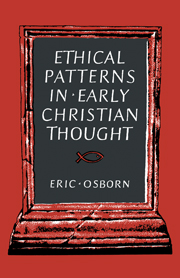Crossref Citations
This Book has been
cited by the following publications. This list is generated based on data provided by Crossref.
Gould, Graham
1987.
Basil of Caesarea and the Problem of the Wealth of Monasteries.
Studies in Church History,
Vol. 24,
Issue. ,
p.
15.
1991.
Preface to the Homilies of Chrysostom.
Studies in Church History. Subsidia,
Vol. 8,
Issue. ,
p.
138.
2000.
Der Weg des Weinens.
p.
255.
Sandnes, Karl Olav
2002.
Belly and Body in the Pauline Epistles.
Hägg, Henny Fiskå
2006.
Continence andMarriage:theConcept ofEnkrateiainClement ofAlexandria1.
Symbolae Osloenses,
Vol. 81,
Issue. 1,
p.
126.
Gluchman, Vasil
2019.
The literary works as a code of ethics in Great Moravia.
Ethics & Bioethics,
Vol. 9,
Issue. 3-4,
p.
106.
SÖNMEZ, Zekiye
2022.
Ahlâkî Erdemler Bağlamında İsa Mesih’in İnsanlığının Taklidi ve Takibi.
İnsan ve Toplum Bilimleri Araştırmaları Dergisi,
Vol. 11,
Issue. 3,
p.
1838.
SÖNMEZ, Zekiye
2022.
Yeni Ahit İle İznik Öncesi Ve Sonrası Kilise Babalarında İsa Mesih’in Taklidi Ve Örnekliği Meselesi.
Dinbilimleri Akademik Araştırma Dergisi,
Vol. 22,
Issue. 2,
p.
863.
Graham, Nicole
2022.
Humour in the Beginning.
Vol. 10,
Issue. ,
p.
48.
SÖNMEZ, Zekiye
2022.
İsa Mesih’in Tanrısallığının Taklidi ve Bunun Orta Çağ Hıristiyan Dünyasındaki Yansımaları Üzerine Bir Değerlendirme.
Oksident,
Vol. 4,
Issue. 1,
p.
113.
Chistyakova, Olga Vasilievna
and
Chistyakov, Denis Igorevich
2023.
Reenvisioning Plotinus’ Doctrine of the Triad in Byzantine Christianity as a New Type of Ethics.
Religions,
Vol. 14,
Issue. 2,
p.
151.





